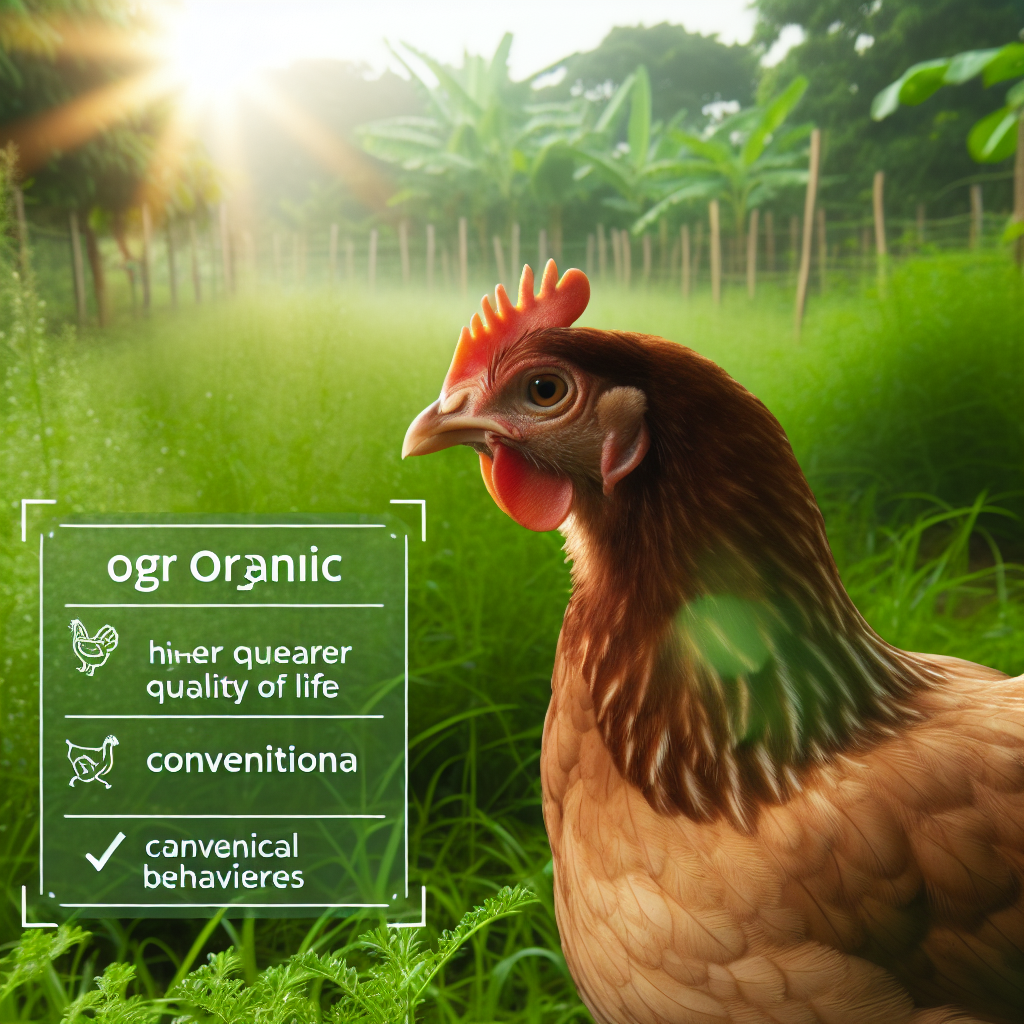Have you ever wondered about the difference in egg quality between organically raised chickens and conventionally raised chickens? When it comes to your breakfast staple, the quality of the eggs can greatly impact both taste and nutrition. In this article, we’ll explore the comparison between eggs from organically raised chickens and conventionally raised chickens, shedding light on the factors that may contribute to differences in egg quality. Get ready to discover how these two approaches to chicken farming can affect your morning omelette in more ways than you might expect!
Nutritional content
Comparison of macronutrients
When comparing the macronutrient content of eggs from organically raised chickens to those from conventionally raised chickens, there is not a significant difference. Both types of eggs contain relatively equal amounts of protein, fat, and carbohydrates. This means that from a macronutrient perspective, you can expect similar nutritional benefits from consuming eggs regardless of whether they come from organic or conventional sources.
Comparison of micronutrients
In terms of micronutrients, studies have shown that eggs from organically raised chickens may have slightly higher levels of certain vitamins and minerals. This is likely due to the organic farming practices, which often involve providing hens with a more diverse and nutrient-rich diet. These eggs may have slightly higher levels of vitamins A, E, and B12, as well as minerals such as iron and zinc.
Differences in omega-3 fatty acids
One notable difference between organic and conventional eggs is the level of omega-3 fatty acids. Omega-3 fatty acids are essential for brain health and have been linked to various benefits such as reducing inflammation and improving heart health. Organic eggs have been found to contain higher levels of omega-3 fatty acids, which can be attributed to the hens’ access to a more natural diet that includes seeds and insects. Conventional eggs, on the other hand, may have lower levels of omega-3 fatty acids due to the hens’ diets mainly consisting of corn and soy.
Presence of antibiotics and hormones in conventionally raised eggs
Conventionally raised chickens are often subjected to the use of antibiotics and hormones to promote growth and prevent disease. These substances can occasionally find their way into the eggs produced by these chickens. In contrast, organic farming practices prohibit the use of antibiotics and hormones, ensuring that eggs from organically raised chickens are free from these potentially harmful substances. This can be an important factor for individuals who are conscious of their exposure to antibiotics and hormones and prefer to avoid them.
Production methods
Organic farming practices
Organic farming practices focus on providing a natural and balanced environment for the chickens. This includes access to outdoor areas where they can roam freely, a diet that is free from genetically modified organisms (GMOs), and the prohibition of the use of antibiotics and hormones. Additionally, organic farmers prioritize the use of sustainable and environmentally friendly practices to minimize their impact on the surrounding ecosystems.
Conventional farming practices
Conventional farming practices, on the other hand, often involve confining chickens to indoor spaces with limited access to outdoor areas. The diet provided to conventional chickens typically includes genetically modified grains and may also involve the use of antibiotics and hormones. Conventional farmers may also rely on pesticides and chemical fertilizers to maximize production.
Impacts on egg quality
The differences in farming practices can have an impact on the quality of the eggs produced. Eggs from organically raised chickens are often considered to have superior taste and texture due to the hens’ access to a more natural diet and their ability to engage in natural behaviors. The hens’ exposure to outdoor areas also allows them to consume a more varied diet, which can contribute to the overall quality of the eggs they produce. In contrast, eggs from conventionally raised chickens may lack the same depth of flavor and texture.
Use of pesticides and antibiotics
One notable advantage of organic farming practices is the prohibition of the use of pesticides and antibiotics. Conventional farmers often rely on these substances to control pests and prevent disease. While the use of pesticides and antibiotics may be necessary to maintain high production levels in conventional farming, it can also raise concerns about the potential residues of these substances in the eggs. Organic eggs, on the other hand, provide a more reassuring choice for individuals who prioritize minimizing their exposure to potentially harmful chemicals.
Feed and diet
Organic chicken feed composition
Organically raised chickens are typically fed a diet that consists of organic grains and seeds, and they also have access to a natural foraging area where they can consume insects and other small organisms. The organic feed is free from genetically modified ingredients, pesticides, and synthetic fertilizers. This diverse and nutrient-rich diet contributes to the overall quality of the eggs produced by these chickens.
Conventional chicken feed composition
Conventional chickens are typically fed a diet that primarily consists of genetically modified grains, such as corn and soy. These grains are often treated with pesticides and synthetic fertilizers, which can find their way into the eggs. The lack of diversity in the diet of conventional chickens can result in eggs that may not have the same nutritional value as those from organically raised chickens.
Effect on egg nutritional quality
The diet of the chickens has a direct impact on the nutritional quality of the eggs they produce. Organically raised chickens, with their access to a diverse and natural diet, are able to produce eggs that are higher in essential vitamins, minerals, and omega-3 fatty acids. The absence of genetically modified and pesticide-treated grains in their diet also contributes to the overall purity and quality of the eggs.
Implications for human health
The differences in feed and diet between organic and conventional chickens can have implications for human health. Eggs from organically raised chickens, with their higher nutritional value, can provide individuals with a more nutrient-dense option. The increased levels of vitamins, minerals, and omega-3 fatty acids in these eggs can contribute to overall health and well-being. Additionally, the absence of genetically modified ingredients, pesticides, and synthetic fertilizers in the diet of organically raised chickens reduces the potential exposure to harmful substances.
Environmental factors
Organic chicken habitat and welfare
Organic chicken farming practices prioritize providing a natural and stress-free habitat for the chickens. Organic chickens have access to outdoor areas where they can engage in natural behaviors such as foraging and dust bathing. This outdoor access not only improves the welfare of the chickens but also allows them to consume a more varied diet, resulting in eggs that are of higher quality and nutritional value.
Conventional chicken habitat and welfare
In contrast, conventional chicken farming often involves confining chickens to indoor spaces with limited or no access to outdoor areas. This confinement can lead to increased stress and limited opportunities for natural behaviors. The lack of outdoor access also restricts the chickens’ diet, resulting in eggs that may not have the same nutritional value and quality as those from organically raised chickens.
Impact on egg quality and nutritional content
The difference in the habitat and welfare of chickens can directly impact the quality and nutritional content of the eggs they produce. The natural behaviors and varied diet provided to organically raised chickens allow them to produce eggs that are superior in taste, texture, and nutritional value. The stress and limited diet experienced by conventionally raised chickens can result in eggs that lack the same depth of flavor and nutritional benefits.
Sustainability considerations
Organic chicken farming practices prioritize sustainability by minimizing the use of synthetic inputs such as pesticides and chemical fertilizers. These practices help maintain and improve the quality of the soil, air, and water in the surrounding environment. Additionally, the focus on providing a natural and stress-free habitat for the chickens aligns with the principles of animal welfare. This holistic approach to farming promotes a more sustainable and environmentally friendly food production system.
Eggshell quality
Comparison of shell thickness
There is typically no significant difference in the thickness of the eggshells between organic and conventional eggs. Both types of eggs have shells that are strong enough to protect the contents of the egg.
Eggshell color differences
The color of the eggshell can vary depending on the breed of the chicken rather than the production method. Both organic and conventional eggs can come in a variety of colors, including white, brown, and even blue or green in some cases.
Calcium levels and shell strength
Calcium is an essential nutrient for the formation and strength of eggshells. Both organic and conventional chickens require adequate calcium in their diets to produce eggs with strong shells. As long as the diet provided to the chickens meets their calcium requirements, the eggshells should have similar levels of strength regardless of whether the eggs are organic or conventional.
Implications for consumer preference
The color and thickness of the eggshells do not necessarily indicate a difference in the nutritional quality or taste of the eggs. Consumer preference for eggshell color may vary, with some individuals preferring brown eggs, while others prefer white eggs. However, it is important to note that the nutritional value of the egg is determined by factors beyond the color or thickness of the shell.
Antioxidant levels
Higher antioxidant levels in organic eggs
Studies have shown that organic eggs have higher levels of antioxidants compared to conventional eggs. Antioxidants are compounds that help protect the body from cellular damage caused by free radicals. The higher levels of antioxidants in organic eggs can be attributed to the chickens’ access to a diverse and nutrient-rich diet that includes sources of antioxidants such as green forage and insects.
Reasons for the difference
The higher levels of antioxidants in organic eggs can be attributed to several factors. The organic farming practices that prioritize a natural and diverse diet for the chickens result in a higher intake of antioxidants through their foraging activities. Additionally, the absence of pesticides and synthetic fertilizers in their diet reduces the potential interference with the antioxidants present in their feed.
Health benefits of antioxidants
Antioxidants play a crucial role in maintaining overall health and preventing chronic diseases. They help protect the body’s cells from damage caused by free radicals, which can contribute to the development of conditions such as heart disease, cancer, and Alzheimer’s disease. Consuming foods that are rich in antioxidants, such as organic eggs, can provide individuals with the necessary protection against oxidative stress and contribute to their overall well-being.
Implications for consumer choice
The higher levels of antioxidants in organic eggs can be a compelling factor for consumers who prioritize the nutritional value and health benefits of the foods they consume. By choosing organic eggs, individuals can increase their intake of antioxidants and support their overall well-being. However, it is important to note that a balanced and varied diet that includes a wide range of antioxidant-rich foods is essential for optimal health and should not solely rely on a single food source.
Cholesterol and fat content
Cholesterol levels in organic eggs
The cholesterol levels in eggs, whether organic or conventional, are primarily determined by the breed of the chicken rather than the production method. Various factors, such as genetics and diet, can influence the cholesterol content in the eggs. Therefore, there is no significant difference in cholesterol levels between organic and conventionally raised eggs.
Differences in fat composition
While there may not be a significant difference in total fat content between organic and conventional eggs, studies have shown that the fat composition can differ. Organic eggs may have slightly higher levels of omega-3 fatty acids, which are considered beneficial for heart health. Conventional eggs, on the other hand, may have higher levels of omega-6 fatty acids, which can be pro-inflammatory when consumed in excess.
Impact on cardiovascular health
The impact of egg consumption on cardiovascular health is a complex topic that extends beyond the cholesterol and fat content. Research suggests that consuming eggs in moderation as part of a balanced diet does not significantly contribute to heart disease risk. The overall quality of an individual’s diet, including the types and amounts of fats consumed, exercise habits, and genetics, plays a more significant role in cardiovascular health than the specific cholesterol and fat content of the eggs.
Interpretation for dietary recommendations
When considering the cholesterol and fat content of eggs, it is important to interpret the findings in the context of current dietary recommendations. The American Heart Association suggests limiting dietary cholesterol intake to less than 300 mg per day for most individuals, while also focusing on heart-healthy fats. Incorporating eggs, whether organic or conventional, into a balanced diet that is low in saturated and trans fats can be a reasonable choice for individuals without existing heart health concerns.
Price and availability
Comparison of organic and conventional egg prices
Organic eggs are typically priced at a higher cost compared to conventional eggs. The exact price difference can vary depending on factors such as location and market demand. Organic eggs often require more resources and follow stricter regulations, which can contribute to the higher price tag.
Factors influencing price difference
Several factors contribute to the price difference between organic and conventional eggs. The production costs for organic eggs are generally higher due to the use of organic feed, organic farming practices, and increased labor requirements. The demand for organic eggs has also been steadily increasing due to consumer preferences for organic and sustainably produced food. Limited availability and a higher demand for organic eggs further contribute to the price difference.
Accessibility of organic eggs
The accessibility of organic eggs can vary depending on location. Organic eggs are more readily available in urban and suburban areas where there is a higher demand for organic and specialty food products. However, in rural areas, the availability of organic eggs may be more limited due to lower demand and a smaller market.
Consumer demand and market trends
Consumer demand plays a significant role in the availability and pricing of organic eggs. Over the years, there has been a growing interest in organic and sustainably produced food products. This increased demand has led to expanded availability and a broader range of organic egg options in many markets. As consumer preferences continue to evolve, it is likely that the demand for organic eggs will continue to shape the market trends.
Consumer preferences
Perceptions of organic eggs
Many consumers perceive organic eggs as a healthier and more environmentally friendly choice compared to conventionally raised eggs. The emphasis on organic farming practices, the absence of antibiotics and hormones, and the higher nutritional value of organic eggs contribute to these positive perceptions. Organic eggs are often associated with notions of quality, purity, and a more sustainable approach to food production.
Consumer trust in labeling
Labeling plays a crucial role in consumer trust and decision-making. The organic certification provided by regulatory bodies ensures that specific standards and guidelines are met for organic products, including eggs. Consumers often trust these labels as an indication of organic farming practices, higher quality, and aligned values. Verification and enforcement of labeling regulations are essential to maintain consumer trust in the authenticity and reliability of organic eggs.
Factors influencing egg purchase decisions
When making purchasing decisions, consumers evaluate various factors such as price, quality, nutritional value, and their personal beliefs and values. The desire for healthier options and concerns about the environmental impact of conventional farming practices often drive consumers to choose organic eggs. However, accessibility, price, and convenience are also important considerations that can influence consumer choices.
Health and environmental concerns
Consumers increasingly consider the health and environmental impact of their food choices. The preference for organic eggs stems from concerns about the potential health risks associated with antibiotics and hormones used in conventional farming practices. Additionally, the focus on sustainability and minimizing the use of synthetic inputs in organic farming aligns with the environmental values of many consumers.
Food safety considerations
Microbial contamination in eggs
Microbial contamination is a potential food safety concern associated with egg consumption. Both organic and conventional eggs can be contaminated with bacteria such as Salmonella. However, strict hygiene practices and proper handling and storage of eggs can greatly reduce the risk of microbial contamination.
Pathogen prevalence in organic and conventional eggs
Research has shown that there may be a slightly higher prevalence of Salmonella in organic eggs compared to conventional eggs. This is likely due to the outdoor access and varied diet of organically raised chickens, which may increase their exposure to potential sources of contamination. However, it is important to note that proper handling and cooking of eggs can effectively eliminate the risk of foodborne illness.
Food safety regulations
Food safety regulations are in place to ensure that eggs, regardless of their production method, are safe for consumption. These regulations include guidelines for safe handling, processing, and storage of eggs to minimize the risk of microbial contamination. It is important for both producers and consumers to follow these regulations to ensure the safety of eggs.
Risk mitigation strategies
To reduce the risk of foodborne illness, it is important to follow proper food safety practices when handling and preparing eggs. This includes washing hands thoroughly, using clean utensils and surfaces, refrigerating eggs promptly, and cooking eggs to the recommended temperature. These simple but effective strategies can greatly reduce the risk of microbial contamination and ensure the safety of eggs for consumption.




